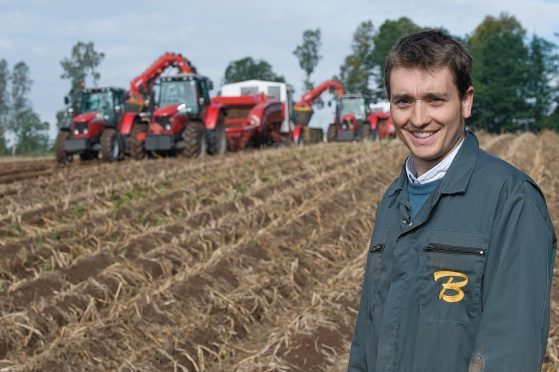Nutrition, cultivation and seed will be the 2017 focus for AHDB’s potato monitor farm project hosted by Bruce Farms in Perthshire.
Next year’s programme of field-scale trials and demonstrations is tailored to specific areas that affect the Scottish industry and was developed following consultation with growers who attended a launch event this summer.
Bruce Farms manager, Kerr Howatson, said the farm aimed to demonstrate good crop husbandry and to try to identify the optimum conditions for growing seed and ware potatoes.
“It is not a one size fits all approach, but the project will highlight practical measures growers can use on their own farms,” he said.
Commercial companies involved in the trials include Albert Bartlett, whose technical manager, Michael Inglis said growers needed to respond to the challenging retail requirements of quality, yield and efficiency.
He added: “There has never been a more trying environment for potato growers in the UK; this requires farm-based research and development to provide guidance on tackling these difficult issues.”
Branston Ltd senior agronomist Jim Aitken will be involved in nutrition demonstrations and he sees merit in looking at matching nitrogen inputs of a crop to customer requirements and adjusting nitrogen levels to allow for organic manure applications.
“We need to look at nitrogen inputs, because getting those levels right will help us grow the type of products customers are looking for,” he said.
“Take for example Maris Piper for the chipping trade and Maris Piper for pre-packing. While the chipping market needs a high proportion of big tubers with a high dry matter, pre-pack crops need to be harvested earlier to get the best skin finish and too many growers are delaying bulking and skin-set by using too much nitrogen.”
He also believes growers need to embrace the benefits of organic fertiliser applications.
“There is a reluctance to accept, in many cases, that inorganic fertiliser applications can be substantially reduced when farmyard manure and other bulk organic fertilisers are applied,” he added.
“It would be reassuring if we could demonstrate how bold you can be when cutting back bagged fertiliser in the presence of applied organic material.”
Cultivation trials have already begun and initial results will be released at the end of the year.
Claire Hodge, AHDB Potatoes knowledge exchange manager, said the work was examining areas such as removing secondary cultivation, reducing working depths and improving soil structure to see what could be changed without compromising the friable, free-draining and non-compacted seed-beds that potatoes need.
